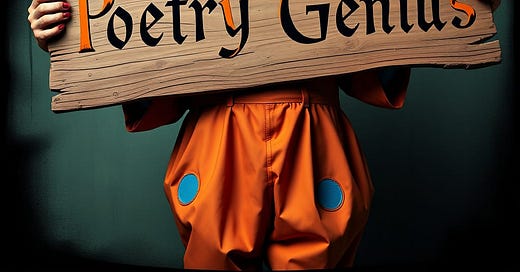YOUR METAPHORS ARE KILLING POETRY
A survival guide for people who think everything is like something else
Dear aspiring poets who believe that comparing your ex-girlfriend to a wilted flower makes you the next Maya Angelou: please stop. Just stop. Your metaphors aren't profound; they're predictable. They're not illuminating; they're insulting to both flowers and breakups.
Every time you write "love is a battlefield" or "life is a journey," somewhere in the world, a literature professor takes another antacid and questions their career choices. Your metaphors have all the originality of elevator music and twice the capacity to make people want to leave the room.
YOUR METAPHORICAL CRIMES AGAINST HUMANITY:
1. Using the same tired comparisons everyone has used since the dawn of time "Her eyes were like stars." Really? Which stars? The dying ones? The ones that exploded millions of years ago but we're still seeing their light? Or did you just mean they were shiny? Because if you meant shiny, maybe try "like wet pennies" or "like the screen of a phone someone just sneezed on."
2. Mixing metaphors like you're making a terrible smoothie "Life is a rollercoaster journey on the highway of dreams where we're all just ships passing in the night."
PICK ONE. Are we on a rollercoaster, a highway, or a ship? Are we having a transportation crisis? Do we need to call AAA for metaphorical roadside assistance?
3. Making everything about weather because you lack imagination Storms for emotions, rainbows for hope, sunshine for happiness. What are you, a meteorologist who failed poetry class? The weather is not your personal emotional support system.
4. Comparing women to flowers, food, or natural disasters She's a rose (thorny but beautiful), she's a peach (sweet and soft), she's a hurricane (destructive but exciting). Women are not your personal produce section, and they're not weather patterns. Try describing an actual human being for once.
5. Using extended metaphors that collapse under their own weight You start with "life is a book" and then spend forty-seven lines explaining how chapters are years and pages are days and typos are mistakes and paper cuts are... stop. We get it. You understand how books work. This doesn't make you Hemingway.
WHAT YOUR METAPHORS REVEAL ABOUT YOU:
Your lazy metaphors tell us you haven't looked closely at anything. You've never really examined a flower, or you'd know they're more than just pretty and fragile. You've never watched a storm, or you'd know they're more complex than just "angry nature."
Good metaphors reveal hidden connections. They make us see both things differently. Your metaphors make us see nothing except your lack of observation skills.
HOW TO WRITE METAPHORS THAT DON'T MAKE PEOPLE WANT TO THROW BOOKS:
Get specific. Don't say "her laugh was like music." What kind of music? A kazoo? A mariachi band? The sound your car makes when it needs an oil change? Specificity is what makes metaphors memorable.
Find unexpected connections. The best metaphors link things that seem unrelated but share some essential quality. Don't go for the obvious. Go for the true.
Make it work for the whole poem. If you're going to use a metaphor, commit to it. Don't just drop it in the first line and forget about it like it's a New Year's resolution.
Consider the connotations. When you compare someone to a flower, you're not just saying they're beautiful. You're saying they're delicate, temporary, decorative. Is that what you mean? If not, find a better metaphor.
Test your metaphor by extending it. If you can't think of three specific ways your comparison works, it's probably not a good metaphor. It's just lazy word association.
METAPHORS THAT WOULD ACTUALLY BE INTERESTING:
Comparing social media to a slot machine (the intermittent reinforcement, the bright lights, the way it empties your pockets)
Describing insomnia as being a ghost in your own life (invisible, restless, haunting familiar spaces)
Likening customer service calls to archaeological digs (layers of bureaucracy, searching for something valuable, requiring patience and specialized tools)
See how these work? They make you think about both things differently. They reveal something true about modern life through unexpected connections.
THE BOTTOM LINE:
Stop using metaphors as shortcuts to depth. Start using them as precision tools. The goal isn't to sound poetic; it's to see clearly and help others see clearly too.
And please, for the love of all that is sacred in literature, stop comparing your love life to natural disasters.
The weather has enough problems without becoming responsible for your relationship issues.







Hi Tom! I am recovering from surgery number 10 on my ankle. I am 2 weeks out and got a fresh, new cast 2 to 3 days ago. My leg and ankle are lined up beautifully but to be they need more time to heal. Loved this piece about metaphors. Going to share it.